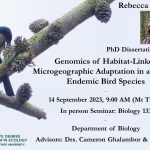Global biodiversity loss is one of the foremost concerns of conservation efforts in the 21st century. The maintenance of genetic diversity within species is a critical factor in a species’ persistence and adaptive potential in the face of changing environmental conditions. Migratory species make up more than 12% of the global vertebrate biodiversity and pose distinct challenges to conservation efforts due to inhabiting different geographical regions at different times of the year. The field of conservation genomics provides a valuable toolkit to addressing and understanding global biodiversity loss but requires additional methodological developments to better address the conservation challenges posed by migratory species. In my dissertation, I demonstrate advancements in conservation genomics aimed toward better understanding migratory species. In my first study, I addressed the question of ecological and genomic vulnerability to climate change in the Brown-capped Rosy-Finch (Leucosticte australis), an elevational migratory songbird of conservation concern. Second, I addressed a methodological gap in population genomics and developed statistical genetics models for using genotype likelihood data from low-coverage whole genome sequencing data to implement population assignment. In my last study, I demonstrate the utility of low-coverage whole genome sequencing for population assignment with detailing migratory connectivity in the American Redstart (Setophaga ruticilla). Altogether, my doctoral research demonstrates how genomic tools can help unravel the complexities of migratory species conservation. Furthermore, the species-specific results are tied to knowledge gaps identified by wildlife managers and provide valuable information tied to conservation and management applications.



